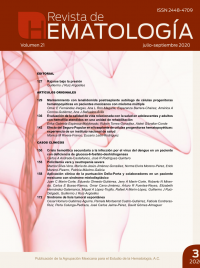Polycythemia vera and severe neutropenia.
Rev Hematol Mex. 2020; 21 (3): 153-157. http://doi.org/10.24245/rev_hematol.v21i3.3874
Marisol Silva-Vera,1 María de Jesús Jiménez-González,1 Norma Elvira Moreno-Pérez,1 Erick Moreno-Pizarro,2 Patricia Máximo-Galicia2
1 División de Ciencias de la Salud e Ingenierías, Universidad de Guanajuato, campus Celaya-Salvatierra, Guanajuato.
2 Departamento de Medicina y Nutrición, Universidad de Guanajuato, campus León, Guanajuato.
Resumen
ANTECEDENTES: La neutropenia, definida como un recuento sostenido de neutrófilos de menos de 1.5 x 109/L, es una anormalidad hematológica común que puede ser transitoria o crónica. La identificación de la mutación JAK2V617F es un criterio diagnóstico importante de las neoplasias mieloproliferativas clásicas, como la policitemia vera, trombocitemia esencial y mielofibrosis primaria. Sin embargo, esta mutación también se observa en otras neoplasias mieloides, como la leucemia mieloide aguda y el síndrome mielodisplásico, aunque con una frecuencia considerablemente menor que la de las neoplasias mieloproliferativas clásicas. La neutropenia no es un criterio diagnóstico de otras neoplasias mieloides y en los algoritmos diagnósticos de neutropenia se excluye la medición de la mutación JAK2V617F.
CASO CLÍNICO: Paciente masculino de 69 años que fue referido a la consulta externa de hematología por padecer neutropenia de un año de evolución, con antecedente de ser atendido por el servicio de urgencias por precordialgia y disnea, descartando toda enfermedad cardiorrespiratoria. La biometría hemática mostró únicamente neutropenia severa. El frotis de sangre periférica no reportó alteraciones morfológicas. Una biometría hemática posterior mostró valores de hemoglobina de 17.5 g/dL y hematócrito de 47.9%, por lo que se decidió identificar la mutación JAK2 que resultó positiva. Actualmente el paciente es tratado con hidroxicarbamida y se reporta estable.
CONCLUSIONES: La comunicación de este caso permite demostrar la importancia del buen estudio clínico del paciente y de la adecuada correlación de estudios de laboratorio para establecer el diagnóstico de manera oportuna y acertada.
PALABRAS CLAVE: Policitemia vera; neutropenia; JAK2.
Abstract
BACKGROUND: Neutropenia, defined as a sustained neutrophil count of less than 1.5 x 109/L, is a common hematologic abnormality that may be transient or chronic. The identification of the JAK2 V617F mutation is an important diagnostic criterion for classical myeloproliferative neoplasms, such as polycythemia vera, essential thrombocythemia and primary myelofibrosis. However, this mutation is also observed in other myeloid neoplasms, such as acute myeloid leukemia and myelodysplastic syndrome, although with a frequency considerably lesser than that of classical myeloproliferative neoplasms. Neutropenia is not a diagnostic criterion for other myeloid neoplasms and in the diagnostic algorithms for neutropenia the measurement of the JAK2V617F mutation is excluded.
CLINICAL CASE: A 69-year-old male patient who was referred to the outpatient hematology department for neutropenia of one year of evolution is reported, with a history of being treated by the emergency department for precordialgia and dyspnea, ruling out all cardiorespiratory diseases. Hematic biometrics evidenced only severe neutropenia. The peripheral blood smear did not report morphological abnormalities. A subsequent blood count showed hemoglobin values of 17.5 g/dL, and hematocrit of 47.9%, so, it was decided to identify the JAK2 mutation resulting positive.
CONCLUSIONS: Currently the patient is treated with hydroxycarbamide. The communication of this case allows demonstrating the importance of the good clinical study of the patient and the adequate correlation of laboratory studies to establish a timely and accurate diagnosis.
KEYWORDS: Polycythemia vera; Neutropenia; JAK2.

